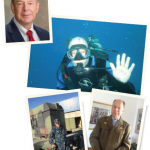And there was plenty of stress. He says the Seabees traveled throughout western Iraq, building combat outposts. The biggest risk to his battalion was improvised explosive devices that terrorists had planted along the roads.
But urban warfare offered other dangers.
“In Iraq, you can’t tell the difference between the people who like you and the people who want to kill you,” he says, adding that while stationed at the Al Asad Air Base, he made numerous trips along dangerous roads to several combat posts, villages and various cities, including Fallujah and Ramadi.
In between treating soldiers for combat injuries and illnesses, he completed the Seabee Combat Warfare Officer and Fleet Marine Force Officer training programs to ensure he had the same combat training as other officers.
“I wanted to know everything about the weapons, what they did, in case something went wrong,” he says, adding that he routinely carried a 9 mm sidearm and an M16 rifle when traveling. “I had to also be able to use a machine gun in the turret if the gunner went down.”
Luckily, Dr. Meehan had to fire his weapons only during target practice. He was never involved in any direct, small arms fire.
When it came time for him to leave Iraq in 2008, he was relieved. No Seabees in his battalion had died.
Unlike his previous deployment in the Gulf War, where returning troops were back in the U.S. within 72 hours, Dr. Meehan and other Seabees were initially sent to Kuwait for one week, which wasn’t a combat zone. In this “warrior transition program,” he says, they surrendered their weapons and supported or comforted each other by talking among themselves about their experiences. Then they traveled back to Port Hueneme to de-stress for several weeks before returning home. He believes this down time was very therapeutic and reduced incidents of post-traumatic stress disorder.
More Work Ahead
Dr. Meehan never really stopped treating warriors. In 2009, he and Cecile Rose, MD, who practices occupational and pulmonary medicine, launched the nation’s first post-deployment lung health program at NJH. Supported through DOD grants and donors, it’s dedicated to service members and contractors who were deployed to Iraq and Afghanistan and returned with complex pulmonary problems associated with airborne hazards. So far, the program has treated 150 service men and women.
Looking back, perhaps the experience Dr. Meehan misses most from military medicine is the camaraderie he enjoyed among the soldiers, sailors, airmen and Marines with whom he deployed.
